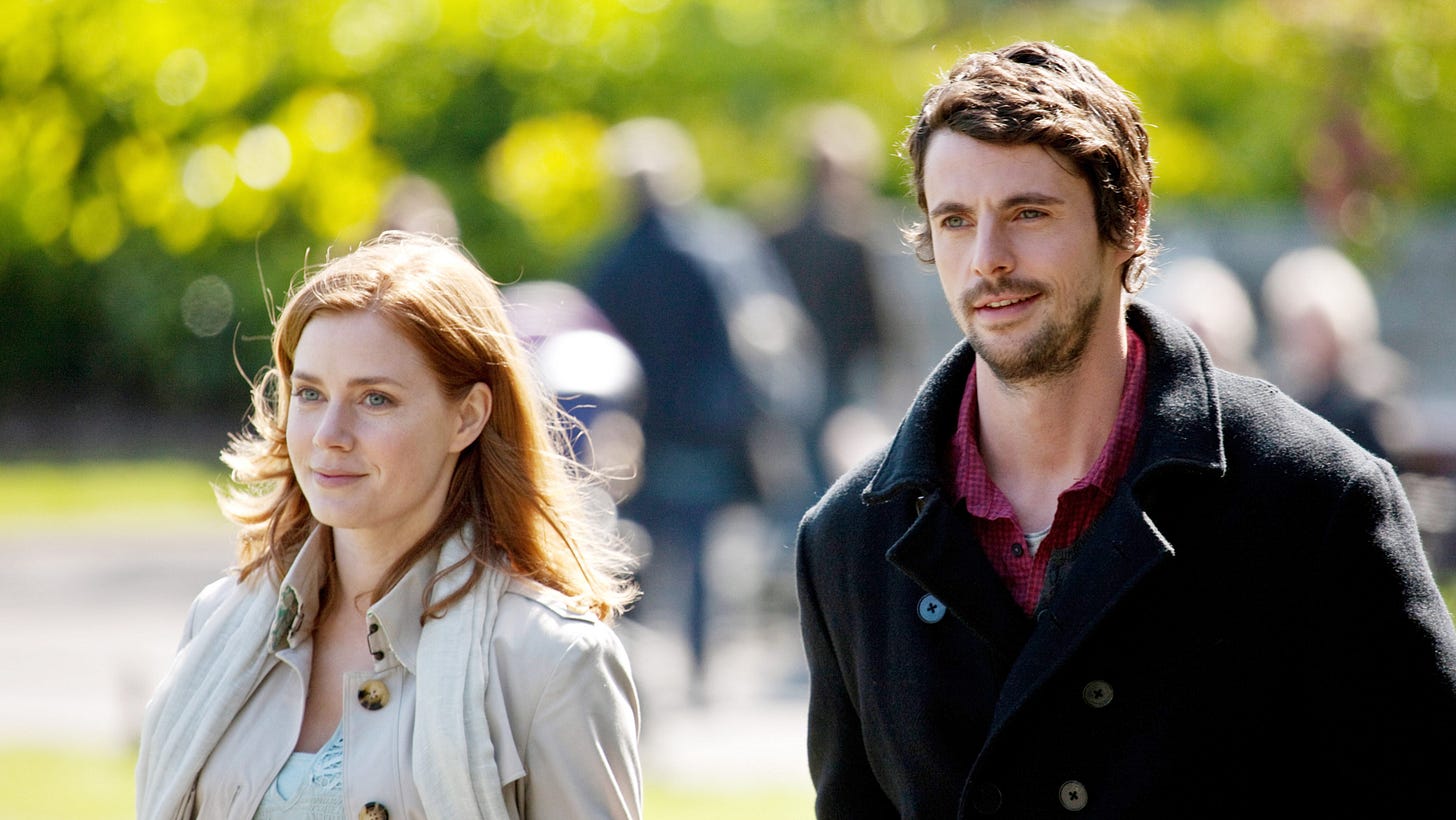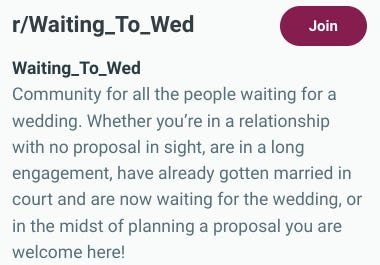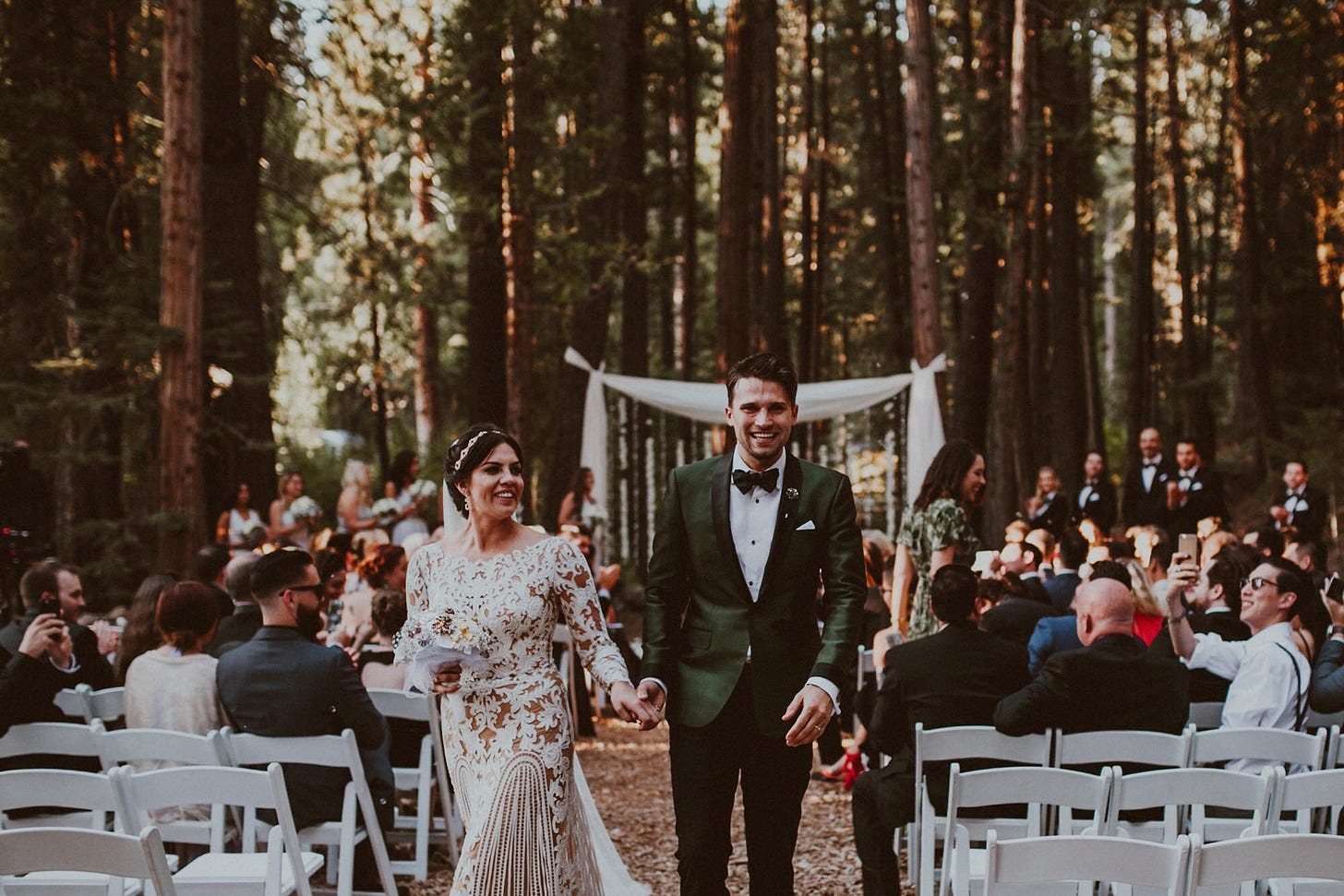In 2019’s Little Women, Amy March gives an impassioned speech on the economics of marriage. She is resolute and unequivocal: for women in the 1860s, marriage was an economic proposition. There were laws around whether women could own property or retain custody of their children if their husbands deserted or divorced them. Choosing a husband was a matter of life and death, with women effectively sealing their fates the moment they said “I do”.
In 2025, marriage is in a weird place, culturally. I’ve written about how eroding trust in social institutions has led to a rise of both alternative relationship styles (polyamory) and nihilism (economic crisis). While some are opening their marriages and seeking thirds, others are pinning all of their hopes and dreams on their primary relationships. I’m talking, of course, about one of the most fascinating places on the internet: the Waiting to Wed subreddit.
For the uninitiated, Waiting to Wed is a subreddit for people seeking community and advice while waiting to take the next step in their relationship. Ideally, this would be a place for people seeking advice on transitioning their lifestyles from being a couple to being married, with all the legal, emotional, financial, and social implications therein. Unfortunately, it’s mostly a place for people in terrible relationships to ask for advice on how to upgrade said relationship, as if the act of having a wedding will transform them, bless them, and make them new.
It would be easy to judge from the outside. Most posts strike two distinct chords: those who have been together for years seeking to reify their relationships in the eyes of the law (we’ve been together for 12 years, have 3 kids and own a home together, how do I get him to propose?) or the very young seeking to skip to the next stage of life without doing the work of living (I’m 23 and all my friends are married, we’ve been together for 18 months, how do I get him to propose?).
Taking a step back, it becomes clear that the women (for the sub is 99% women speaking to other women, with very rare exceptions) giving advice are operating under clear-eyed, shrewd mandates interested in protecting other women. When faced with the “he says marriage is just a piece of paper/he doesn’t believe in marriage/we already live together” arguments, commenters are quick to list the myriad legal protections given to spouses under the law, especially when it comes to custody and child support. Their interest is in women remaining protected and getting what they deserve, especially for those essentially doing everything in their relationships. While it’s easy to mock the original posters for wanting to legally bind themselves to men who can’t be bothered, one explanation is simple: it’s hell out here, it’s horror.
Almost a decade ago, I was in graduate school and wanted to understand how crumbling markers of adulthood for Millennials led to a decline in the marriage rate. While studying the literature, I found that marriage was being delayed due to financial concerns:
When choosing to cohabit, women often take their finances into account and choose to offset marriage to enable some sense of financial security before beginning their adult life with a partner (Addo 2014). Women historically have much more to lose when choosing a partner to live with, so it is understandable they would choose to be more practical in their decisions.
In 2024, the age of first marriage (a slightly shady data point) rose again to 30.2 for men and 28.6 for women in the US. The average cost of a wedding in 2024 was $33,000 ($45,400 in New York), a mighty sum for those who don’t receive help from their parents/families.
When discussing marriage, finances, cohabitation rates etc., it’s important to note that not all women have identical experiences and that intersectionality is often ignored in mass sociological research: the experiences of Black women, women of color, and non-heterosexual women are often not seen or studied in the small sample sizes. If I could get another degree, I would focus on all the gaps in the research, but perhaps things have changed since I graduated.

Rising cohabitation rates are directly related to different conceptions of marriage: Sharon Sassler wrote that members of the middle class see cohabitation as a step towards marriage and a more permanent commitment, while members of the working class see it as a financial necessity, moving in together much more quickly and being less likely to marry after living together. By academic standards, this is old research, but I don’t think things have gotten better since 2011. Recently, we’re seeing that class is becoming a greater divider than ever when it comes to marriage: middle class marriage is declining, most people with a college degree marry another person with a college degree, and most high-earners also marry one another (a phenomenon known as assortative matching— link opens to a PDF of a paper titled Assortative Marriages and Household Income Inequality filled with excellent data).
There is also something to be said about the deep loneliness of being the last person in one’s friend group to enter a relationship or get married. Advice columns and podcasts are filled with the pleas of women who feel isolated, embarrassed, and ashamed that everyone in their immediate social circle is married while they are not (ditto for the subreddit). And that’s for people with social circles to begin with: 53% of Americans say they only have one to four close friends, and 8% say they have no close friends at all. For seventy years, most Americans have prioritized the nuclear family at the expense of all other relationships— I can’t count the number of couples I know who spend most of their time solely with each other.
For women posting on Waiting to Wed, It feels as if the choice isn't to be married or be single: the choice seems to be between being alone, excised from social gatherings and community due to their singledom, or being lonely in a relationship they’ve become inured to.
Vanderpump Rules gave us one of the most egregious examples of this. In 2016, Katie Maloney and Tom Schwartz got married after five years together. Maloney, a sullen server (or SURver, as they worked at Sexy Unique Restaurant1) spent the first four years of the show begging Schwartz, an ineffectual manbaby, to propose. He did, and their wedding was marketed as a triumphant victory for a woman who had spent years smiling lovingly in a chagrined manner2 as Schwartz poured a beer on her head (twice), cheated on her, insulted her, and refused to take her or any of her concerns seriously.
Of course, there is the sunk cost fallacy to take into account. Katie knew Schwartz was a loser and a cheater, and yet she spent all of her twenties with him. It’s easy to understand the need to “win” by marrying your tormentor, as then the suffering wasn’t for naught: you get a wedding and the opportunity to begin anew. Unfortunately, in most cases, the suffering is all there is.

On reality television, marriage has moved from the goalpost at the end of the journey (The Bachelor) to the opening chapter of attempted matchmaking stories gone awry (Married at First Sight). People attempt to bring their partners to America via marriage (90 Day Fiance) or temporarily move to foreign countries in order to lock in partners (Before the 90 Days). Love is Blind forces couples to get engaged sight unseen before marrying at the end of one month.
But no show depicts the catch-22 of marriage like The Ultimatum: Marry or Move On. A psychological torture device disguised as entertainment, the premise of the show is simple: a group of 5-6 couples torn on whether or not to marry enter an experiment where the solution to their impasse is to break up, date/live with someone else on the cast, and then re-couple with their original partner in order to determine if they want to get engaged or part ways.
I love reality dating shows because I find human behavior fascinating, but The Ultimatum is a bridge too far. The couples follow familiar archetypes across seasons: a reformed fuckboy and their partner desperate to lock them down, an insanely young couple where one partner is desperate to legitimize the relationship, a couple where one partner is clearly over it and the other person’s self esteem is too low to acknowledge it… it’s depressing.
The parallels to Waiting to Wed are clear and present, but having the information isn’t helpful. If anything, it makes it more tragic that so many people are silently suffering, hoping that a grand gesture will save them from the reality of their relationships.
The sociological concept of liminality describes the mid-phase, or transition, between two states and the ambiguity that results from existing in between two places: a way of describing being neither here nor there. This can be used for macro-level societal transitions or micro-level rituals. I think it applies for many members of the subreddit: despite having the traditional markers of adulthood (a home, children, a partner), many exist in the space between single and married3. How many societal conversations have we had about the use of the word partner? After a decade together, the term “boyfriend” often isn’t enough.
To study liminality is to immerse yourself in the awkwardness. Researchers describe liminality as the act of standing at the threshold between an old identity and a new one, and reading hundreds of posts over the last three months has sharpened this idea for me. Members of the sub are standing at doorways, waiting to walk through to the lives awaiting them on the other side. Will they be better? Will they be worse? The only way to know is to cross over.
Morality Slogans
The New York Times caused discourse by asking Should Your Partner Really Be Your Best Friend? I said no (YouTube link) due to reading Esther Perel’s The State of Affairs. Nothing sours a relationship more than unmet expectations, and expecting a cis straight man to fulfill every emotional, practical, sexual, and financial need is asking for disaster (according to Perel and many other therapists). People rushed to tell me they indeed married their best friend, but I’m allergic to bean soup comments: best friend is a tier! And I’ll believe it when I see it.
Marriage rates have diverged by education level (2016). Worrying!
Isabel Sawhill wrote about cohabitation, marriage, and parenthood in 2014, stating that “family formation is a new fault line in the American class structure”. There’s more recent research around this. Brad Wilcox at The Atlantic wrote The Awfulness of Elite Hypocrisy on Marriage, filled with data points about how liberal college graduates claim that marriage isn’t important and you can be happy without it, but usually marry before having kids.
In news regarding rising conservatism, multiple TikTok trends have taken to openly shaming single mothers. Commenters claim to be against “baby mama culture”, but there’s a lot of misogynoir floating around. It is decidedly not my place to write about any of it, but wanted to call out as much of the research around marriage/cohabitation inevitably ties into birth rates and conversations around family formation.
“The gender imbalance in time spent on caregiving persists, even in marriages where wives are the breadwinners. Women who are the primary earner in their marriage spend slightly more time than husbands on paid work, and they have considerably less leisure time.” More data for you.
Somehow whenever we have this conversation everyone is married to the most caring, sensitive, gentleman who does all of the chores and pays all of the bills. I fear someone is lying. There’s an entire book (Fair Play) about how women need to stand up to their husbands when it comes to chores and caregiving. I read a lot of divorce books and the uneven division of marital labor is high on the list of reasons women get fed up.
New York Magazine is so messy. I loved this examination into how many New Yorkers are subsidized by their parents (many).
It will never not make me gasp that Lisa Vanderpump named her restaurant Sexy Unique Restaurant. Insane!!
Thank you, Gillian Flynn.
I am not saying that living with a partner/having kids/living together is an inferior form of being in a relationship. I’m pointing to the fact they’re posting on Waiting to Wed: clearly they want to take the next step. It’s a matter of a self selecting population.







I feel sad for people whose spouse/partner isn’t *one of* their best friends, but I also feel sad for people whose spouse/partner is *their only* best friend. It’s unhealthy at best and rife for (or caused by) predation at worst
Pardon how pedantic I’m about to get, but I think the obsession with getting married young that gen z is currently experiencing is a direct result of macro-level liminality. Much like the 1950s was a societal liminal space that was influenced heavily by rapid and intense change (WWII and all the Everything associated with it), I think the 2020s are a societal liminal space. And in the 1950s, we clung to a nonexistent suburban ideal as a source of stability amid a terrifyingly uncertain landscape. It makes sense that young 20-somethings are jumping the gun on marriage right now – it feels like control and accomplishment and Doing Life Correctly.